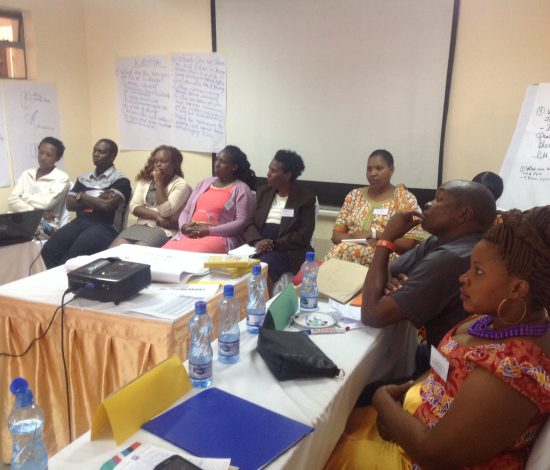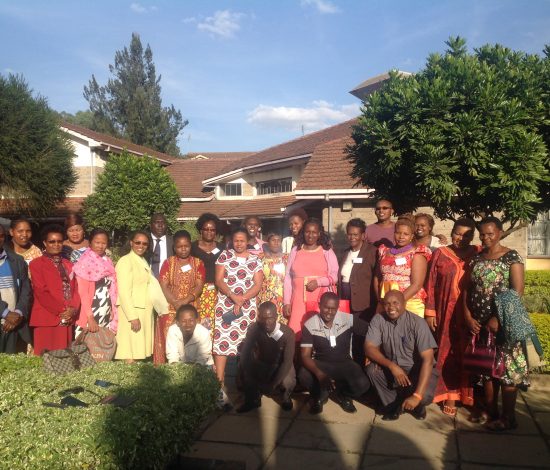Kenya Evangelical Lutheran Church (KELC) Training
HFAW’s advocacy work expanded beyond our usual Counties (Nyamira and Kajiado and reached Kisii County. HFAW was invited by Kenya Evangelical Lutheran Church (KELC) to train the Kisii KELC community. The topic was “Raising Awareness on Gender Based Violence, Female Genital Mutilation/cut and Economic Empowerment through Popular Education Model in Kisii and Nyamira Counties”Over 100 congregants from Menyenya Evangelical Lutheran church(MELC) including the neighbouring congregants from Catholic, Seventh day Adventists, (SDA) Pentecostal Assembly of God (PAG) and other community members who did not adhere to any denomination attended the training. We also reached over 35 members at Mongoni village in Nyamira County.

Using Popular Education, we facilitated the communities (Kisii and Nyamira) to identify their own issues in the context of GBV, FGM/C and Economic empowerment; so as to be able to analyse their own reality, take control of their own learning and work toward transformation.
It was evident that Gender Based Violence (GBV) is rampant in this community.
Using picture clip of a man battering his wife and other men trying to intervene, the participants were able to describe what they saw on the clip, what they thought was the cause of the problem, effects of the problem on the community and solution to the problem. This led to the participants reflecting on their lives in the community. Hence it sparked a heated discussion surrounding GBV in the community. One woman participant blamed the rampant domestic violence on alcoholism. “Men have forgotten their responsibility nowadays, she said, they wake up and go to drink and then when they come home they ask for food and if the woman is hesitant to provide it, she is kicked.” Another man participant reiterated that “Women are the cause of GBV because they gossip a lot, whatever happens in the house you find that it is out there and the same women she gossips with bring the gossip back to us, what do you think would happen?” He asked
Another man participant stood up and said “Another thing is robbery without violence, a man keeps his money in his coat only to find the woman took it!” in reiteration a woman said “If she had her own money, could she go taking her husband’s money?” she continued “We can’t wait to hear about what you have to say about economic empowerment project, it is very much needed here.” she said. The participants couldn’t stop discussing this issue (GBV) as it seemed very pertinent to them.They also discovered that there is acute lack of basic information on GBV and effective process to hold the perpetrators accountable.
The facilitator went in detail explaining what GBV really is and why it happens. Many of the reasons shared today are not just triggers but excuse for violence. There is no excuse for battering a woman and in some cases a man. The person who batters does so because of power and control. They feel the entitlement to violate the other person. That also happens because many of the participants are not aware of the law against GBV and the consequences. She urged the participants to inform themselves about the law and how to hold the perpetrators of violence to account. She spent some time raising awareness on actions that are described as violence, what the law says and the consequences. Many new questions arose concerning the difficulties of implementation of the law in places where the systems are not in place. However, the facilitator encouraged them to begin somewhere.
Discussions around Anti-FGM Messaging
HFAW introduced a new topic FGM, which the participants said was rampant and that they have not been told why they should not practice it. It was imperative to create an environment of trust between the participants and the facilitators and this has proven to be very effective in our trainings when handling such a sensitive topic. The participants become comfortable in sharing their intimate views. During the discussion a woman shared that she bled a lot when she was circumcised, she said “it is God’s grace that I am alive today.” To stop the bleeding the practitioners brought a dog and made him jump over her several rounds as they all believed it will stop the bleeding. In this community if a girl happens to die due to over bleeding, her mother is accused of having extra marital affairs or the family of the deceased girl say it was due to witch craft the participants shared.
Even though FGM/C is Kisii culture, the men were shocked to discover what women go through given the effects of circumcision on them. Women were equally surprised, even though they are the victims and the perpetrators of circumcision, they didn’t realise the gravity of the effect circumcision has on them. This is because the community associate some of the effects with witchcraft. After our frank discussions revealed what really happens during FGM, one village elder swore “If I see anyone, anyone taking a girl for the mutilation, he will stop at nothing but take things in his own hands.” He said.
Another woman reiterated that many men out there demand that their girls must be “circumcised” oblivious of what the girl goes through. In response, one man said that many men are hidden from the truth. “Women send the children to their grandmothers for the cut and under so many guises, men hardly have any control over these issue” he lamented.With understanding of the gravity of FGM/C, its effects and the legal implications accompanying it, the participants vowed to end FGM/C menace in their community.
The participants also learnt that the constitution has many provisions which allow for both men and women to work together to enhance the principles of democracy and create a culture where each citizen is equally valued and has rights to participate in governance, regardless of ethnicity, gender and disability status among others. The participants understood that both men and women are equal under the law. “I am surprised we had rights we didn`t know about” Said a woman.
Discussions about Poverty and Economic Empowerment
Towards the end of the program we discussed issues pertaining to poverty. Open discussions revealed the causes and impact of poverty. Through discussions and exercises the participants realizes that they do have many resources in their community which they are not currently tapping into. It downed on them that “poverty is the mind, wealth is in their hands.”
The participants realized that one of the things that makes the not to come out of the poverty is the kind of leaders they elect when they sale their votes. The facilitator gave detailed link between poverty, bad governance and their rights and encouraged them to take action personally and at community level. Self and community advocacy, electing leaders of integrity, holding their leaders to account, tapping into local government resources were some of the strategies identified to be used to tackle poverty.
To help them actualise their goals they learnt about an action plan which is a simple tool that will help them work with purpose to improve their lives.
Popular Education Training: EwuasoKedong, Kajiado County
In 2016, HFAW was invited by an affiliate of the Evangelical Lutheran church to demonstrate how to use Popular Education to counter FGM and poverty at Ewaso Kedong in Ngong hills Kajiado County. We trained 21 members from the community. They were from various background, religious leaders, teachers, community development agents, county and national government representatives and the youth.
With knowledge of Popular Education, how it works and where it has worked, the trainees were surprised to learn that they are the ones who know their own problems they face as a community and have solutions to them. This was evident when they were able to identify issues affecting their community for example early marriages, unwanted pregnancies, FGM, domestic violence, overworking, least educated, and rape cases were some of the issues they identified affecting their community. They were also able to prioritize issues that needed urgent attention.

With knowledge of their rights, the trainees were happy to have learnt that they had rights and that they can always demand for their rights. They immediately formed a committee to take up leadership on the issues raised as priority in the community.
LUCCEA TOT Training on the Abandonment of FGM/C
The Lutheran Communion in Central and Eastern Africa (LUCCEA)Secretariat, having been informed about HFAW work in Nyamira and our unique approach (Popular Education model) in tackling the issues invited us to train the women and youth on Popular Education.
The TOT training entitled “The LUCCEA ToT Training for Accelerating Abandonment of FGM/Cut,” brought Twenty five women and youth from nine countries in East and Central Africa to Kenya to attend the training. The countries were: Kenya, Rwanda, Burundi, Uganda, Eritrea,Ethiopia, Tanzania, Congo and Madagascar. In wanting to find ways of overcoming mere awareness on FGM/C and building strong and new
strategies that will end FGM/C; the training was simple, hands on, practical, participatory as well as interactive with fun, exercises, song and games. In addition, we also used visual by sharing real life photos and documentaries of what really happens during the so called “circumcision” and engaged participants in critical and analytical questions about the photos and documentaries.
“It is an idea whose time has come” said one of the participants from Kenya about Popular Education and ending FGM/C.
A reverend from Uganda said “Now I feel a strong obligation to end FGM whatever it takes.”
At the end of the training were able to come up with a Regional and individual Action Plan that they will use in their respective countries.

